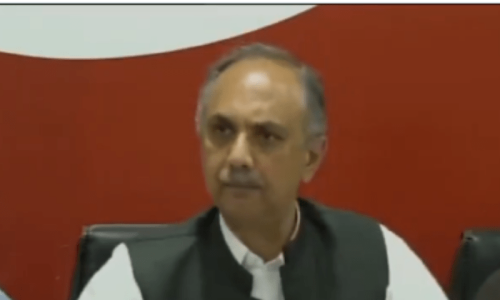ISLAMABAD: The Contempt of Court Bill, 2012, which was passed by the National Assembly on Monday, sailed through the Senate on Wednesday in the absence of the PML-N.
President Asif Ali Zardari rushed to Islamabad hours after the passage and is expected to give a formal assent to the bill and turn it into an act of parliament any moment.
The highlights of the prolonged proceedings of the Senate included warnings by Barrister Aitzaz Ahsan and Mian Raza Rabbani of the PPP that at least two clauses of the bill were bound to be struck down by the Supreme Court, a view that was instantly endorsed by Mushahid Hussain Syed of the PML-Q, and harsh comments by Awami National Party’s Haji Adeel and Azam Khan Hoti against the judiciary in particular and Chief Justice Iftikhar Muhammad Chaudhry in general.
The enactment of the law will in all likelihood provide Prime Minister Raja Pervez Ashraf at least temporary relief in the contempt case being heard in the Supreme Court.
The controversial legislative process was completed a day before resumption of the hearing of the National Reconciliation Ordinance (NRO) implementation case at the Supreme Court. The attorney general is supposed to inform the court about intent of the prime minister on writing a letter to the Swiss authorities for reopening graft cases against President Zardari.
The legislation, which had been challenged in the Supreme Court even before its enactment, proposes immunity to holders of public office from trial on contempt charges in exercise of performance of their functions.
Rules were suspended after a motion by Law Minister Farooq H. Naek was carried by the house through voice vote amidst an uproar by the opposition.
Leader of the Opposition Ishaq Dar said it would be the blackest day in parliamentary history if the law was bulldozed in abuse of numerical strength. He termed it a mala fide attempt to defeat the spirit of some of the constitutional provisions. “The Constitution cannot be taken hostage or rendered infructuous through a simple law passed in haste,” he remarked.
Azam Hoti of the ANP sought a ruling of the chair to clarify whether parliament was supreme or some other institution. “Who is the creator of the Constitution and who has the right to amend it,” he asked. He said the law framed by parliament should be respected and acted upon.
Mr Hoti said politicians were always made an object of scorn, but they were barred from debating the decisions of an institution. “The nation has given us the right to legislate. If it is not possible then the parliament should be packed up,” he remarked.
He said everything would be all right if all institutions started working within their domain. Barrister Aitzaz Ahsan said that giving immunity to certain individuals would be repugnant to law. He said any law made in haste proved to be detrimental for the government. He was also sceptical of the clause relating to an automatic stay of contempt proceedings in the proposed legislation.
Mian Raza Rabbani said it was time to show maturity and observed that judicial as well as political restraint were required. He also said that two clauses would most probably be struck down when judged on the touchstone of constitutional provisions.
Haji Adeel of the ANP criticised the chief justice’s statement that parliament was not supreme. He said politicians had implemented decisions of the courts, regardless of likes and dislikes. “We accepted judicial murder, we accepted the decision of giving dictators the right to amend the Constitution. We will implement any other decisions, but history will prove who was right and who was wrong.”
He went to the extent of accusing the judges of seeking plots and other favours from the government. He said Hazrat Omar had himself lashed his own son because he knew the convict would get a favour if the task was assigned to some officials.
Haji Adeel said Chief Justice Iftikhar Muhammad Chaudhry should also have followed this example by awarding sentence to his son himself. “Can the officials being asked to proceed in the Arsalan case dare touch the son of a sitting chief justice,” he wondered.
Farhatullah Babar said that in the absence of an appropriate contempt law and the ever-widening scope and interpretation of what constituted contempt, it was imperative that a law was promulgated by parliament. He said the sacking of an elected prime minister and the sentencing of a government official for contempt on charge of staring in a courtroom were indicators of “ever-expanding frontiers of the contempt law”. Hence a suitable law should be enacted, he added.
He said it did not augur well for courts if they were seen to uphold their dignity by recourse to the law of contempt rather than through their verdicts. Quoting Lord Denning, he said the dignity of courts must rest on solid foundations of their judgments and interpretation of law. They should not turn on the “sandy foundations of contempt law”, Mr Babar added.
About a possibility of the law being overturned by the Supreme Court, he said under the Constitution the honourable judges had their functions while parliament had its own functions to perform. “Let the courts do what they have to under the law and let we the parliamentarians do what we are supposed to do.” The parliamentarians should not act as judges and the judges should not act as parliamentarians, he said.
About the remarks of Fakhruddin G. Ebrahim on the contempt law, Farhatullah Babar said the jurist had actually paid a compliment to Farooq Naek that the law minister had done what four jurists like Fakhruddin could not accomplish.
The house will meet again at 5pm on Thursday.
















































Dear visitor, the comments section is undergoing an overhaul and will return soon.